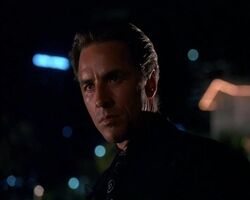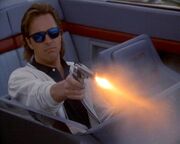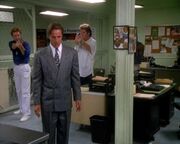
Burnett at Celeste's party in "Hostile Takeover".
The Sonny Burnett Arc is a story arc involving James "Sonny" Crockett becoming his drug-dealing alter-ego Sonny Burnett after suffering severe amnesia. It takes place across the end of season 4 and the beginning of season 5 of Miami Vice, and led to the first and only season-end cliffhanger of the entire series.
The Storyline[]
Crockett Becomes Burnett[]
While working on a new case during "Mirror Image", Crockett boards a boat to attend a summit meeting between rival drug gangs, seeking to sow seeds of dissent amongst their ranks. However, one of the other men at the meet, Alejandro Gutierrez, intends to use the event as an opportunity to eliminate both his boss' people and a sizeable chunk of the opposition, thereby setting himself up as a major player. He plans to do so with a bomb, and despite attempting to subtly warn Crockett away with him, the undercover cop is caught in the explosion and feared dead.

"That's B-U-R-N-E-double-T!" Burnett guns down Hagovitch.
In reality he survives, but with massive head trauma leading to complete amnesia. To add to his troubles, he is found by the cartel he was investigating. Since they only know him as Sonny Burnett, they manage to convince him he really is Burnett, and he subsequently goes to work for the cartel's leader, Manolo, as an enforcer. Burnett quickly impresses with his ruthless style and unwavering loyalty. During his time in Manolo's organisation, he exposes and subsequently kills Gutierrez, takes out several members of a rival gang, guns down corrupt Fort Lauderdale cop Jimmy Hagovitch, and even shoots Tubbs (who is saved by his bulletproof vest). Despite his unquestioning devotion to Manolo's organisation and apparent relish for his new career, Burnett finds himself troubled by strange memories of people and a life he cannot remember.
Burnett Takes Over[]
Manolo is assassinated by a rival organisation before the events of "Hostile Takeover", and Burnett subsequently finds fresh employment for the man who ordered the assassination, Oscar Carrera. While initially proving once again to be an incredibly loyal enforcer and bodyguard, Burnett soon becomes dubious of Carrera's leadership, which he sees as indecisive and lacking in the required ruthlessness. He begins to show his darker side by seducing Carrera's trophy wife, Celeste, and exploiting Carrera's volatile relationship with his son to turn both men against each other, ultimately leading to both their deaths. Burnett takes over as head of the cartel, with Carrera's head hitman, Cliff King, as his lieutenant.
Burnett and King subsequently engage in a very successful drug war with their competition, including the remnants of the cartel Burnett had worked for previously, now led by Manolo's embittered brother Ernesto. Whilst taking his organisation to the top of Miami's drug empire, Burnett kills many more members of the drug underworld, and Castillo begins to believe Crockett really has gone over to the other side and must be destroyed. Only Tubbs retains a sliver of belief in his former partner, and he goes undercover as an interested buyer so that he can try to convince Burnett who he really is. At a preliminary meeting the two talk, but when Tubbs tries to jolt Burnett's memories, the ex-cop remembers that Tubbs is a cop himself and pulls a gun on him once again. A momentary hesitation, caused by a memory fragment of Crockett talking about "bad cops" to Tubbs, gives his former partner the chance he needs to escape.
Burnett Becomes Crockett[]

Crockett hands himself in to his old squad, and is met with weapons drawn.
By the time of "Redemption in Blood", the fragmented memories of Burnett's old life are coming thicker and faster, partially as a result of Tubbs attempting to remind him of who he really is. Burnett becomes increasingly distressed and sinks into alcoholism and depression, despite taking his cartel to new heights and driving most of his criminal opposition out of business. At the same time King, perhaps learning a little too much from watching Burnett's rapid and skilful rise to power, and jealous that this newcomer had obtained so much power while years of faithful service have not improved his own position, begins plotting to take his place. A failed car bomb attempt again leaves Burnett with head trauma and finally causes his memories to return, leaving him horrified at what he has become. Seeing no alternative, he hands himself in to his old Vice squad.
His story is met with skepticism and Crockett finds himself facing the very real possibility of going to jail for his crimes alongside so many criminals he helped to put away. Desperate to clear his name at any cost, Crockett escapes custody and goes back to his cartel, hoping to take the whole organisation down from within before a suspicious Cliff King realises who he really is or Metro-Dade send him to prison for a very long time. He succeeds, saving Tubbs' life in the process and helping to earn back some of the trust he had lost with his old squad.
Aftermath[]
Despite bringing down the old Carrera cartel, Crockett still had to answer for his crimes, including the unlawful killing of several low-level criminals, a police officer, and the attempted murder of Tubbs; according to Tubbs, he had a yellow sheet that made Dillinger look like Bambi. Crockett's only defense was that he couldn't remember anything after the boat explosion, but the rest of the squad struggles to accept what could simply be a convenient alibi. He is forced to take time off to recover, and he is subjected to fierce questioning and psychiatric evaluations, but eventually he is exonerated of all crimes, his previously excellent record as a police officer going a long way to help him. Eventually his friends slowly begin to trust him again, but Crockett is left with serious mental scarring that no doubt ultimately plays a large part in his decision to quit the force in the late episode "Freefall".
Ironically, as the departmental red tape and political scheming that hindered Crockett in his career of law enforcement did not apply to the 'real' Burnett, he was arguably more successful on the wrong side of the law than he ever was at Metro-Dade. In just a few months, he rose from the position of lowly enforcer to be in complete command of the Carrera organisation, dispatching its previous leader with almost casual ease. He also possessed a good business mind, as seen when he offered intelligent expansion advice to his first boss, Miguel Manolo, against complaints from his peers, or when he greatly enlarged the influence of the cartel he had seized from Oscar Carrera. He also survived numerous assassination attempts in the cut-throat world of drug smuggling, and crushed rival organisations swiftly and efficiently. By contrast, many of the villains Crockett pursued as an officer with Metro-Dade escaped prosecution, either through their own mastering of the system, or due to outside (often political) interference. Even when Crockett and the rest of the Vice unit did succeed in bringing down a major player, doing so often exacted a heavy price, and a never-ending stream of organised gangs simply replaced any criminals that were taken off of the streets.
List of Episodes[]
The following episodes are the ones which make up the Sonny Burnett story arc:
- "Mirror Image"
- "Hostile Takeover"
- "Redemption in Blood"
- Although not considered part of the story, Crockett's actions as Burnett are briefly mentioned in "Heart of Night".
- "Bad Timing"
It is also worth noting that Crockett is absent in the next episode, "Borrasca", as he is said to be away testifying. However, the reappearance of Tubbs' beard in a continuity goof indicates the network changed the running order of the episodes when they broadcast them, and that "Borrasca" originally took place before "Bad Timing". This revised sequence implies that Crockett is in fact testifying to try and clear his name following his actions as Burnett, making the episode an indirect part of the story arc in the same way as "Heart of Night".
Notes[]
- The concept of a central plot told over the course of several episodes was quite new at the time the Sonny Burnett story was broadcast. While earlier episodes of Miami Vice had dabbled with such a style (Crockett's on/off relationship with Gina in season 1 being an example), this was the first time a major storyline had been dealt with in this fashion. The multi-episode story arc format is often stated to have been pioneered in Michael Mann's 1986-88 series Crime Story.